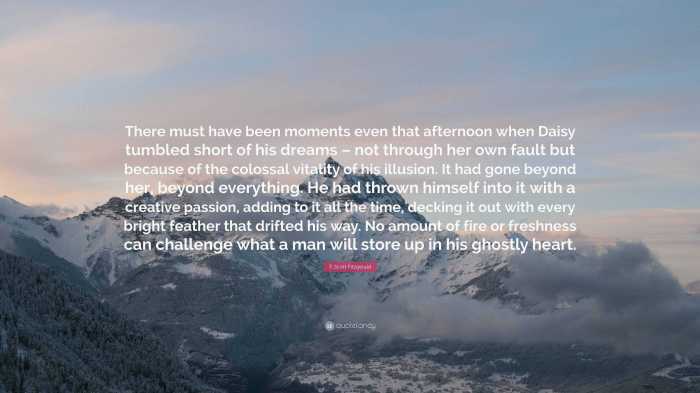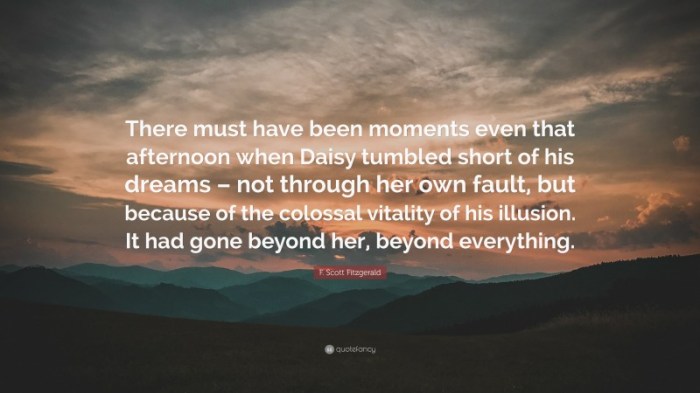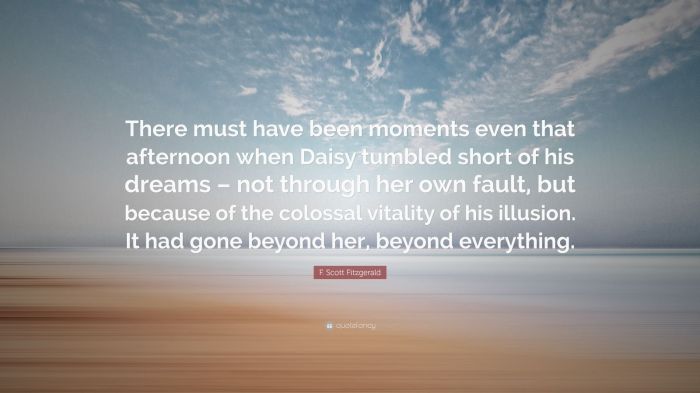There must have been moments even that afternoon when Daisy Buchanan felt a twinge of regret as she looked across the lawn at Jay Gatsby, the man who had loved her for so long and who she had ultimately chosen to leave behind.
This quote, taken from F. Scott Fitzgerald’s The Great Gatsby, provides a glimpse into the complex emotional landscape of Daisy Buchanan, a woman torn between her desire for stability and her longing for passion.
Daisy’s Emotional State

During that fateful afternoon, Daisy’s emotions were a complex tapestry of longing, regret, and confusion. Her feelings for Gatsby had never fully abated, despite her marriage to Tom. The sight of Gatsby’s grand mansion and the realization that he had never stopped loving her stirred within her a bittersweet longing for what could have been.
Simultaneously, Daisy grappled with a sense of guilt and remorse. She knew that her actions had caused Gatsby great pain, and she felt torn between her desire for him and her obligations to her husband and daughter. These conflicting emotions left her feeling vulnerable and uncertain about her future.
Moments of Significance
- Daisy’s initial reaction to Gatsby’s mansion is described as “a mixture of awe and dread.” This reaction reflects her conflicting feelings of longing and trepidation.
- When Daisy asks Gatsby if he has been waiting for her, he responds, “No, I wasn’t looking for you.” This response, while technically true, is also tinged with sadness, as Gatsby had spent years longing for her return.
Gatsby’s Behavior

Gatsby’s behavior towards Daisy that afternoon was characterized by a mixture of love, desperation, and hope. He had spent years planning this moment, and he was determined to win her back. Gatsby’s every action and word was calculated to appeal to Daisy’s emotions and convince her to leave Tom.
However, Gatsby’s behavior also reveals his own insecurities and vulnerabilities. He is aware that Daisy is married and that she may not reciprocate his feelings. Gatsby’s desperation is evident in his willingness to resort to grand gestures, such as showing Daisy his mansion and throwing a lavish party.
Motivations and Character
- Gatsby’s primary motivation is his love for Daisy. He believes that they are meant to be together and that their love is worth fighting for.
- Gatsby’s insecurities stem from his humble beginnings. He is constantly trying to prove himself to Daisy and to the world.
The Significance of the Afternoon
The afternoon Daisy and Gatsby spend together is a turning point in their relationship. It is the moment when they finally confront their feelings for each other and begin to explore the possibility of a future together.
This afternoon also foreshadows the tragic events that will ultimately befall Gatsby. Daisy’s hesitation and her ultimate decision to stay with Tom suggest that their love is doomed from the start.
Symbolism and Foreshadowing, There must have been moments even that afternoon when daisy
- The green light at the end of Daisy’s dock symbolizes Gatsby’s hope for a future with her. However, the fact that the light is unattainable foreshadows the failure of their relationship.
- The rain that begins to fall during the afternoon is a symbol of the tears that will be shed over Gatsby’s death.
Themes and Symbolism

The quote “There must have been moments even that afternoon when Daisy tumbled short of his dreams — not through her own fault, but because of the colossal vitality of his illusion” explores several key themes of the novel, including:
- The power of illusion
- The unattainability of the American Dream
- The destructive nature of love
The quote also uses symbolism to enhance its meaning. The “colossal vitality of his illusion” is a metaphor for Gatsby’s unwavering belief in the possibility of a perfect life with Daisy.
Historical and Cultural Context
The quote “There must have been moments even that afternoon when Daisy tumbled short of his dreams” reflects the social and cultural values of the 1920s. During this time, there was a widespread belief in the power of the American Dream and the importance of material success.
Gatsby’s illusion that he could win Daisy back by amassing wealth and throwing lavish parties is a reflection of this cultural mindset. However, the quote also suggests that the American Dream is unattainable for many people, especially those who are not born into wealth and privilege.
Key Questions Answered: There Must Have Been Moments Even That Afternoon When Daisy
What was Daisy’s emotional state that afternoon?
Daisy was feeling a mix of emotions that afternoon, including regret, longing, and nostalgia.
Why did Daisy choose Tom over Gatsby?
Daisy chose Tom over Gatsby because she believed that he offered her a more stable and secure life.
What is the significance of the quote “There must have been moments even that afternoon when Daisy”?
The quote suggests that Daisy still had feelings for Gatsby, even though she had chosen to marry Tom.